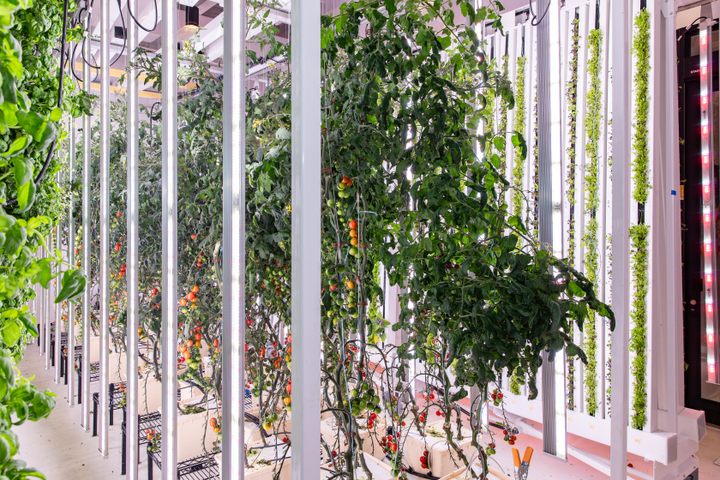

Gastro Obscura’s Guide to Sustainable Denver Dining
Prioritize the planet and pamper your taste buds at these eco-friendly eateries.
Living at the foothills of the Rocky Mountains invites a keen interest in the natural environment. And while Denver is known for attracting eco-conscious travelers and residents, it holds a similar draw for sustainability-focused restaurateurs. Throughout the city, dozens of chefs, brewers, sommeliers, and urban farmers are reimagining our food systems, making them more local, more ethical, and more sustainable than ever. From Root Down, which is 100% wind-powered and constructed from upcycled materials, to Farm & Market, which grows its own produce in-house, these top eateries are leading the charge.
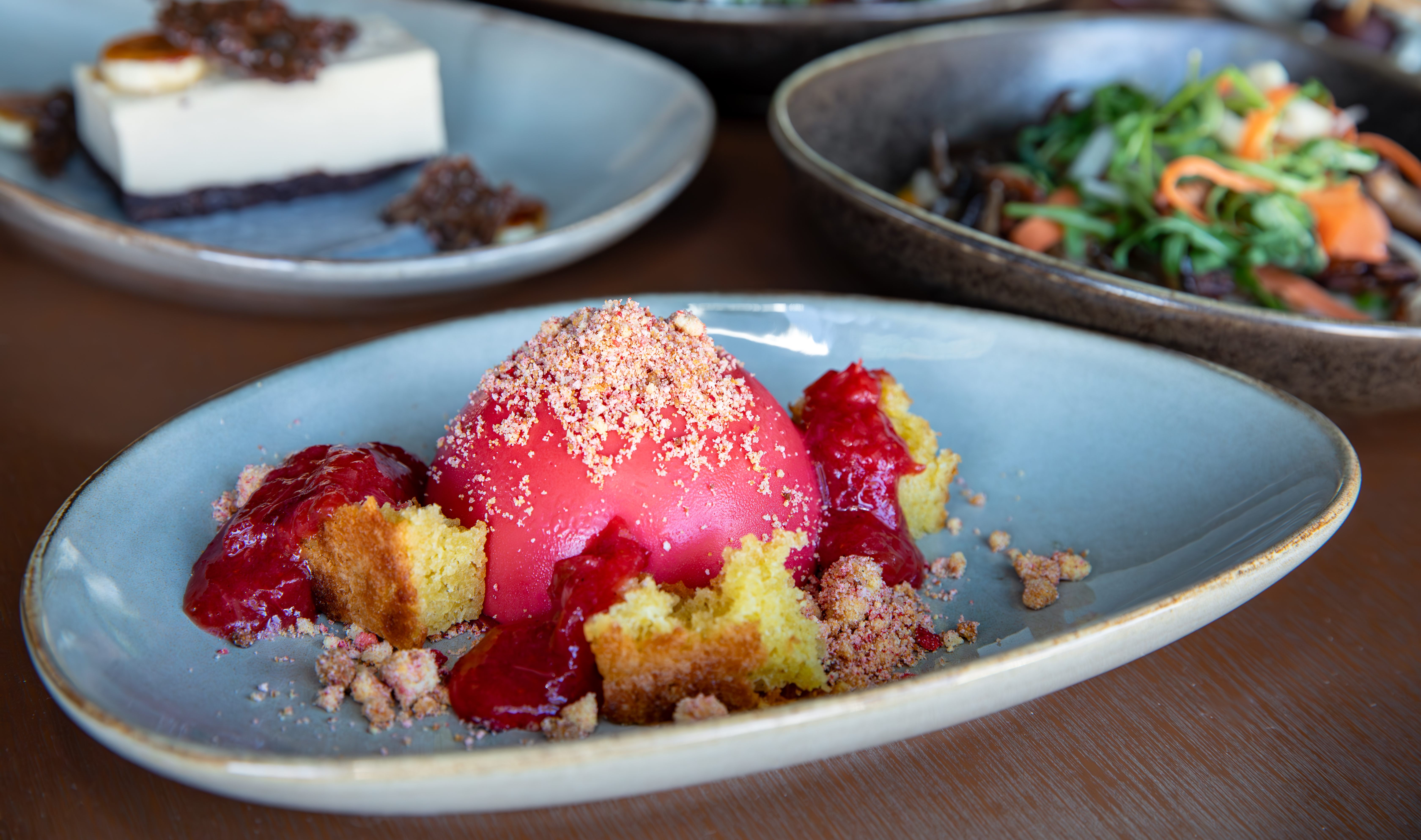
Root Down
A grassroots neighborhood favorite.
This eclectic eatery is a cult classic in Denver’s Highland neighborhood—and the rave reviews come as much from the restaurant’s environmental integrity as its imaginative menu. For starters, much of Root Down’s interior is constructed from upcycled materials. Salvaged storefront windows surround the private dining room, and a retro water tank serves as a hostess table. Some of the seating and art installations are also made from upcycled materials. But that’s just Root Down’s outward-facing commitment to sustainability; most of the real work is happening behind the scenes.The restaurant is partially wind-powered and 100% employee-owned. Its menu relies on seasonal ingredients from local farmers, line-caught seafood, and pasture-raised meats. All these measures contribute to a low carbon footprint—and deliciously fresh food. To taste the difference, start with the crisp baby beet salad, which features Colorado goat cheese and a tangy beet-sunflower pesto. Follow up with the succulent Rock Fish Tom Kha, then polish it all off with a slice of banana cream pie, which comes embellished with smoked sea salt and black sesame whip.

Jax Fish House
Denver’s hub for sustainable seafood.
This laid-back seafood spot has been Denver’s go-to oyster bar for nearly 30 years. In that time, it’s also become a leader in the fight to protect our oceans, thanks to culinary director Sheila Lucero. When she’s not designing menus around seasonal produce or sourcing fresh, sustainably caught fish, Lucero spends her time volunteering for ocean advocacy projects on both coasts. Under Lucero, Jax participates in the James Beard Foundation Smart Catch Program and was the first Colorado restaurant certified by the Monterey Bay Aquarium Seafood Watch.
The hard work pays off. Foodies flock to Jax from all over the city, giving it the lively, boisterous air of any coastal fish house. Come early to snag a seat at the raw bar. Order a round of oysters on the half-shell and bask in the rowdy music of oyster shucking, cracking crab claws, clinking glasses, and popping corks.
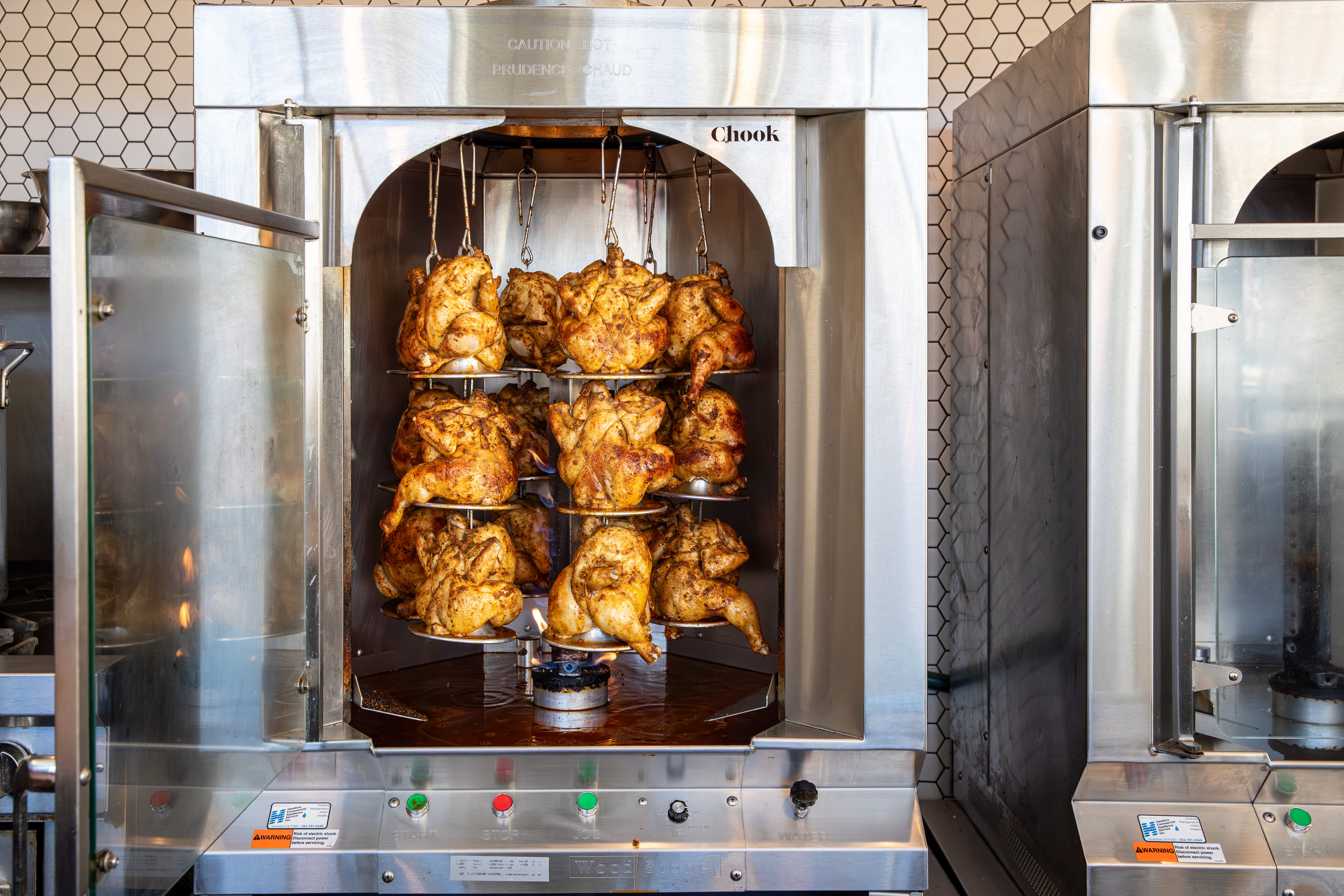
Chook
Fast-casual chicken done right.
On the outside, Chook looks like a fast-casual chicken joint. But on the inside, it’s an innovative culinary project with some serious heavyweights behind it. Founded in 2018, Chook was the brainchild of Adam Schlegel (co-founder of beloved breakfast chain Snooze) and Alex Seidel (voted James Beard Best Chef Southwest). Their dream was to make good, healthy, delicious food accessible to everyone. So, they took a simple recipe—juicy, Australian-style rotisserie chicken crisped over open coals—and perfected it. Today, locals can stop by any of Chook’s three locations and grab a quick bite to eat after work, or take a mouthwatering chicken and sides home for a fast family dinner.
Better yet, 50 percent of all the products Chook uses come from local suppliers. The chickens are raised on local farms, and much of the produce is grown in Colorado. The restaurant hosts donation nights to raise money for local schools and other organizations, and it gives 1 percent of all proceeds back to the community.

Carboy Winery
Showing love to local wines.
Few people think of Colorado as wine country – Carboy wants to change that. This contemporary wine bar offers tastings and bottles of signature wines from its two Colorado vineyards. (It also operates a vineyard in Washington). But local isn’t the whole story. Water is one of the West’s most precious resources, and drought one of grapes’ biggest enemies. To protect the land and ensure the future of Colorado winemaking, Carboy incorporates restorative agricultural practices throughout its wine-growing process—from planting drought-resistant cover crops and heat-tolerant grapes, to using drip irrigation systems to conserve water. It’s also a Zero Foodprint and 1% for the Planet member—making it a good steward of both the environment and its patrons’ consciences. Ever wonder if wine tastes better guilt-free? Grab a seat in the wine garden courtyard, order a glass of red, and see for yourself.

Odell Brewing
Responsibly brewed craft beer.
Founded in 1989, Odell Brewing is synonymous with Colorado craft beer. And like anyone born and raised here, Odell takes being a good neighbor seriously. Today, the company has taprooms in Denver’s Sloan’s Lake and Five Points neighborhoods, where it pours up local beers brewed using solar power and cutting-edge water-saving technologies. Odell also uses a carbon recapture system to recycle the CO2 produced during fermentation. And by 2025, the company will produce zero landfill waste.
Somehow, Odell has managed to drive all that technological innovation without slowing down on the beer front. Every year, the brewery turns out dozens of seasonal and limited-release recipes in addition to its year-round recipes. Fan favorites include the Hazer Tag—a juicy, tropical IPA—and the Sippin’ Pretty, a bright fruited sour. To sample both, head to Odell’s Five Points location, which has 16 taps at its reclaimed-wood bar. More than half of these taps are devoted to exclusive, experimental microbrews produced on-site. Order a flight and snag a seat on the brewhouse rooftop or around one of its two fire pits. Target Thursdays for local crafts workshops and weekends for live music.

Farm & Market
Redefining farm-to-table.
There’s eating local, and then there’s Farm & Market: here, all that separates the farm from table is a pane of glass. The concept was born when brothers Austin and Davis Breedlove dreamed of combining their two loves—cooking and farming—into a single partnership. So, they found and renovated an 80-year-old potato warehouse in Denver’s RiNo neighborhood and kitted it out with cutting-edge hydroponic growing systems. The technology lets them raise more than 100,000 plants at a time in Farm & Market’s indoor facility. The produce is then sold fresh on-site, folded into F&M’s signature dressings and sauces, or incorporated into the restaurant’s farm-fresh menu.
Grab a seat by the window and tour the farm in a single meal with The Emerald Queen, a green bisque made with nine different herbs and greens grown on-site. Follow it up with The Jumper, a bed of spicy micro mustard greens topped with grilled vegetables and delicately seared, krill-fed, sustainably raised salmon.
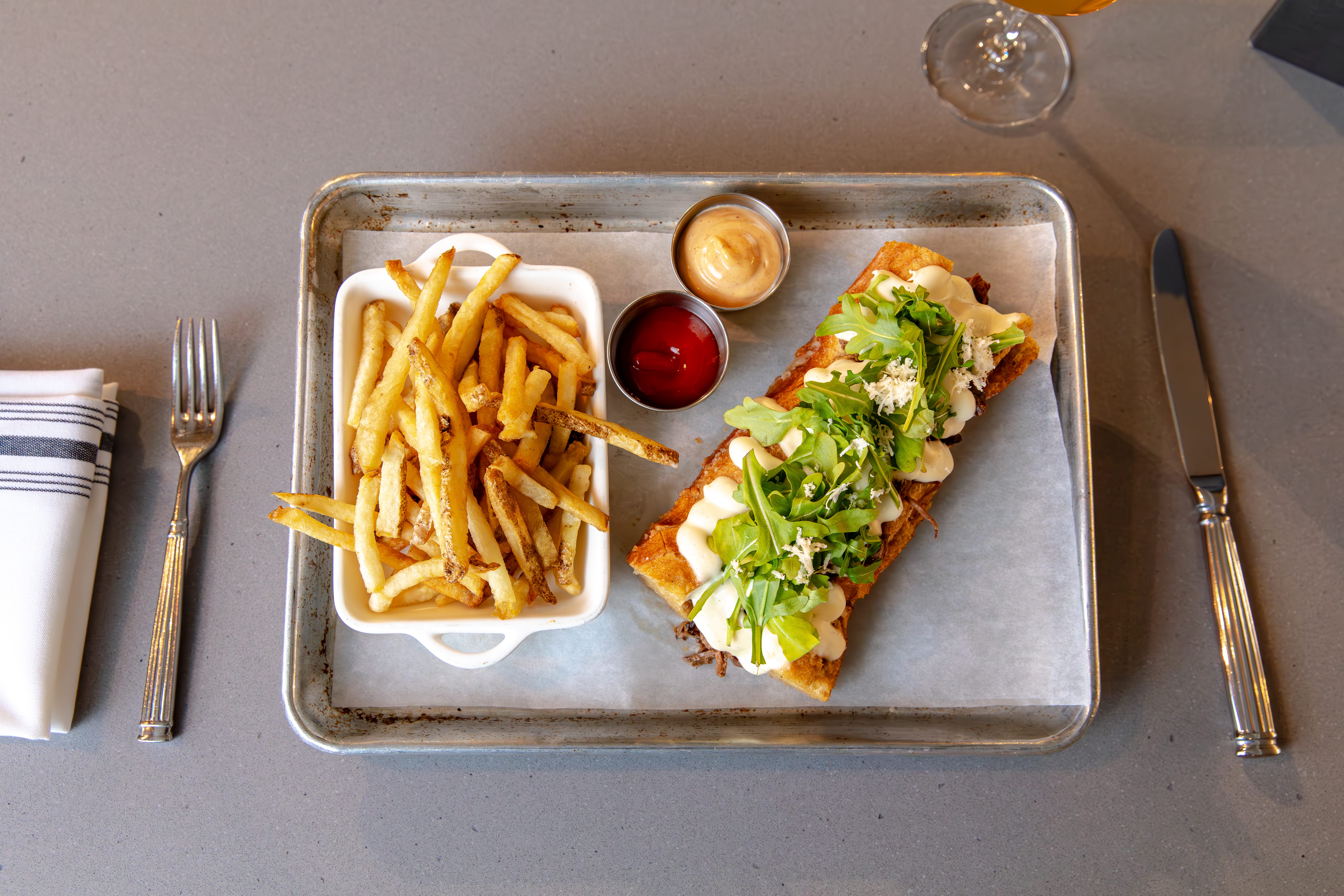
Mercantile Dining & Provision
Upscale comfort food.
Located within the historic brick walls of Denver’s Union Station, Mercantile peddles locally raised food in a sophisticated dining hall setting. This values-driven restaurant leans on a number of ethical pillars, but transparency comes first and foremost; Mercantile wants its patrons to feel connected to their food and to know where every mouthful came from. The answers only seem to enhance the experience. Whether it’s Creekstone beef served with local chicory or Colorado lamb meatballs served with a pomegranate glaze, pondering the story behind the meal is yet another invitation to savor. And the restaurant-to-farm connection extends beyond the plate. Mercantile is also a Zero Foodprint participant and sponsors grants for regenerative agriculture projects around the state.

Urban Farmer
Ethically raised steaks and sides.
This cozy, farm-to-table steakhouse connects Colorado’s long ranching past to its future as a leader in modern, sustainable farming. It all starts with strong community ties. Urban Farmer partners with a robust network of local ranchers, farmers, anglers, and apiaries to bring the freshest, most sustainably grown ingredients to your plate. Choice cuts of meats are seared to perfection and served up in homey, laid-back environs. The restaurant is also serious about its zero-waste ethos: from meat to marrow, it uses the whole animal in its savory steaks, sausages, and broths.
Sponsored by VISIT DENVER. Click here to explore more.








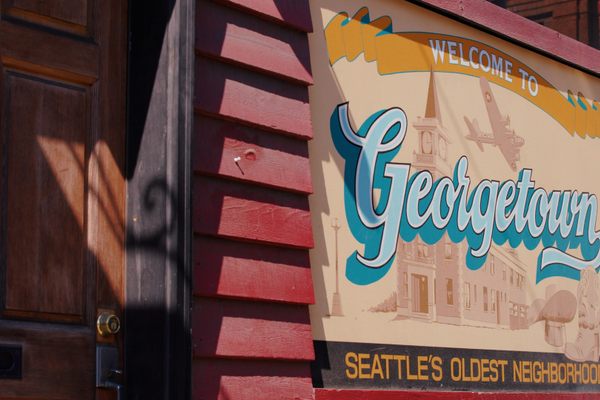















Follow us on Twitter to get the latest on the world's hidden wonders.
Like us on Facebook to get the latest on the world's hidden wonders.
Follow us on Twitter Like us on Facebook